Islamophobia
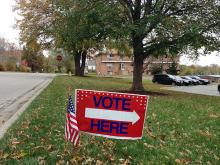
Hamtramck, Mich. residents have elected a Muslim majority to its city council, symbolizing the demographic changes that have transformed the city once known for being a Polish-Catholic enclave.
In Tuesday’s election — with six candidates running for three seats — the top three vote-getters were Muslim, while the bottom three were non-Muslim. Two of the Muslim candidates, Anam Miah and Abu Musa, are incumbent city councilmen, while newcomer Saad Almasmari, the top vote-getter, was also elected. Incumbent City Councilman Robert Zwolak came in fifth place.
Some believe the city is the first in the U.S. with a Muslim majority on its city council.

When a half-dozen activists and community leaders sat down to address interfaith relations in the increasingly diverse heartland city of Nashville, Tenn., one paused before his turn to speak, took a breath and said:
“As a white, male, evangelical pastor on this panel, I guess I represent everything that is wrong.”
The speaker, Joshua Graves, the 36-year-old senior pastor of Otter Creek Church, an 1,800-member suburban megachurch, had a point. Evangelicals like him have had a rocky relationship with American Muslims.
But then again, he may also represent everything that could be right in Christian-Muslim understanding.
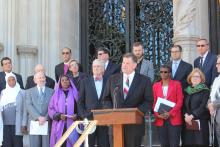
A majority of evangelical pastors consider Islam to be “spiritually evil,” according to one just-released poll, but on Oct. 23 an evangelical pastor and an imam took turns talking about their friendship and mutual respect.
Texas Pastor Bob Roberts and Virginia Imam Mohamed Magid joined dozens of other religious leaders in prayer at the Washington National Cathedral before signing a pledge to denounce religious bigotry and asking elected officials and presidential candidates to join them.
“I love Muslims as much as I love Christians,” said Pastor Bob Roberts, of Northwood Church in Keller, Texas, before leading a prayer at the “Beyond Tolerance” event.
“Jesus, when you get hold of us, there’s nobody we don’t love.”
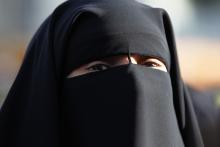
The ban on niqabs, which were seen as a symbol of a spread of radical Islamism, has not stopped some Muslim women from wearing them as a badge of defiance toward a society they say does not accept them.
“This is my way of saying ‘no’ to a government that has robbed me of my freedom,” a veiled woman named Leila, who admitted to not being a regularly practicing Muslim before the law was passed, told the Paris daily Le Monde.
The ban was widely criticized in the Muslim world and there is anecdotal evidence that militant Muslims — both from abroad and French recruits to groups such as the Islamic State — see it as one reason to put France high on their hit list.

This weekend, demonstrators assembled outside several mosques across the country, some decrying “No Sharia law” and “Stop Islamic immigration” and others openly carrying weapons. Dubbed the “Global Rally for Humanity,” dozens of these anti-Muslim rallies were originally planned on social media, but fortunately, only a few materialized.
Hopefully, America won’t have to see another round of protests like the ones that were anticipated this weekend. But if anti-Muslim activities do pop up again, here’s what Christian communities should do.

In our modern world, “terrorist” is a racially coded word we have reserved primarily for describing Muslims engaged in acts of violence. We are quick to label violence as terrorism the moment we learn that the perpetrator is Muslim, yet we immediately stop short when a non-Muslim commits the same act of violence.
Mercer murdered nine innocent people to further his political ideology and worldview. So why don’t we call him a terrorist? As a nation we can’t continue to have it both ways and expect to adequately address the true threats we face together as a country.
Initial reports from the Los Angeles Times referred to him as a “shooter,” CNN.com called him simply a “gunman.” In the case of Roof, initial reports from USA Today referred to him as a “lone wolf,” former Texas Gov. Rick Perry described the shooting as “an accident,” and an expert interviewed by CNN quickly raised the question of mental illness .
The framing of mental illness plays into classic colonialist and Orientalist discourses in which the colonized are presumed to be savage and irrational, whereas the colonizers are rational and civilized. In other words, we presume that a violent white person must be mentally ill, whereas we assume that a person of color is either predisposed or conditioned to be violent.
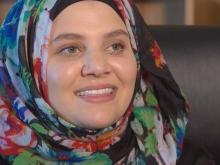
Fort Worth, Texas, native Amneh Jafari never expected to help spark an international movement.
But when the senior University of Texas Arlington psychology major saw a picture on the news showing Irving teen Ahmed Mohamed in handcuffs for bringing a homemade clock to MacArthur High School, it felt personal.
“It really saddened me,” Jafari said.
“I have younger siblings, and I felt like I was looking at them.”
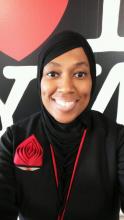
A Muslim flight attendant said the Atlanta-based airline ExpressJet suspended her for refusing to serve alcohol, a practice that is against her religious beliefs.
Charee Stanley filed a discrimination complaint with the Equal Employment Opportunity Commission last week, saying she wants to do her job without serving alcohol, as she was doing before her suspension, her lawyer said.
Lena Masri, an attorney with the Michigan chapter of the Council on American-Islamic Relations, said no one “should have to choose between their career and religion.”
Employers, she told CNN, must “provide a safe environment where employees can feel they can practice their religion freely.”
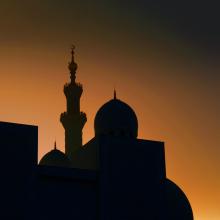
Extremist groups like ISIS and Al Qaida are trying to radicalize young Muslims through well-produced and elaborate online videos and sweeping Twitter campaigns targeted at disaffected young men and women around the world.
Three London school girls recently ran away to join ISIS in Syria after encountering recruiters on Twitter. A Sunday school teacher in Washington state secretly converted to Islam and planned to leave home to join the only Muslims she knew — Isis recruiters she encountered through social media. In Virginia, a local imam meets with young men and women whose families fear they will answer the call of ISIS sent through their cellphones.
As one member of the local law enforcement told our group of 17 international journalists, “There is a terrorist in your pocket and it is talking to you all the time.”
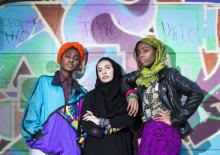
Prominent artists and human rights campaigners have criticized the National Youth Theatre in London for canceling a play because its theme is the radicalization of young British Muslims and their attraction to terrorist organizations such as the militant Islamic State group.
There is growing concern the play, Homegrown — by British–born Omar El-Khairy — was shut down before its scheduled opening on Aug. 15 because of pressure from the British police.
A report in The Times by Jack Malvern, the paper’s arts correspondent, quoted Nadia Latif, the play’s director, saying the police had asked to see the final script of Homegrown before the play opened at a school in Brixton, a part of South London with a large Muslim community.

The first speaker I heard complained to Imam Khalil Abdur-Rashid, the Islamic Association of Collin County representative, about what she understood to be the tenets of his faith.
“It’s not your custom to bury caskets,” she said, referring to the prevalent and erroneous belief that Muslims, who sometimes bury their dead without coffins, may poison the drinking water. The potential pollution of the water was repeated over and over.
1. Death of a Young Black Journalist
“The most basic instinct of a local reporter is to take the importance of her neighbors as a given. In a community like Anacostia—where more than ninety per cent of residents are African-American, one in two kids lives below the poverty line, and incarceration and unemployment rates are among the nation’s highest—this is another way of saying that black lives matter.”
2. Dear NBC, BBC, CNN, and Others: Mugshots Are for Criminals, Not for Their Victims
“Using a mugshot that has no relevance to the circumstances in which Sam DuBose was killed—up against a fully-uniformed photo of his accused killer—suggests that DuBose did something criminal to instigate the cop in his shooting. As yesterday’s grand jury decision confirms, this is blatantly not true. It warps the real story: a cop who allegedly killed an innocent man for no good reason.”
3. We Need to Talk About Feminism and Vocal Fry
“The clash here is not between anti-feminists and feminists. At its heart, the conflict over vocal fry is a clashing of feminist ideologies. … Wolf suggests that young women’s voices aren’t authoritative enough, and implies that they’re somehow squandering all the hard feminist work that came before them. But what’s really happening is a generational shift, both in feminism and in the workplace.”
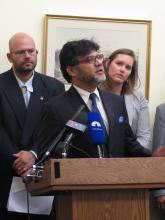
An evangelical pastor from Texas joined American Muslim leaders July 23 in denouncing recent anti-Muslim comments by evangelist Franklin Graham as they announced upcoming efforts to build bridges between their religious communities.
In response to the killing of five service members in Chattanooga, Tenn., last week, Graham — son of evangelical leader Billy Graham — wrote on Facebook that the U.S. should bar Muslims from immigrating.
"I was so sad when I read the Facebook posting of Franklin Graham," Bob Roberts, Jr., pastor of NorthWood Church in Keller, Texas, said Thursday at a gathering on Capitol Hill.
"This is not ‘evangelical’ and even less evangelistic. I don’t want American Muslims to think we fear them or that they are our enemies."

Shortly after news broke last week of the tragic murders in Chattanooga, Tenn., Muslims across the country took to social media to issue their condemnations of the shooting, including Muslim communities in Nashville, New York, the Council on American-Islamic Relations, and the American Muslim Advisory Council .
Nevertheless, an all-too-predictable wave of Islamophobia followed. Republican presidential candidate Donald Trump denounced President Obama because the president did not call the shooting an act of “Islamic terrorism.” And evangelical leader Franklin Graham posted on Facebook that “We should stop all immigration of Muslims to the U.S. until this threat with Islam has been settled.”
But as Ken Chitwood reminds us in “A ‘Radical’ Response to Islamophobia,” (Sojourners, August 2015), Christians have an important role in ending anti-Muslim discrimination. Through the liberating power of Christ, writes Chitwood, “[w]e are no longer enslaved to cultural constructions of antipathy such as Islamophobia.”
THE SO-CALLED WAR on terror has dangerous and shifting financial front lines. Since the 9/11 attacks, a series of “anti-terrorism financing laws” have been enacted that allow the government to designate certain charities as “terrorist” organizations or as financing terror. The government can effectively shut down organizations without ever bringing criminal charges or providing evidence against them, according to the ACLU. “As a result,” it reported, “American Muslim organizations and individuals are unfairly targeted.”
In addition to fostering Islamophobia in the larger society and fear within Islamic and other faith communities, overzealous application of these laws can actually inhibit the war on terror. It risks crippling the very Islamic charities that can effectively combat radicalization in places vulnerable to extremists. Stephen Bubb, head of a charity network in Britain, where financial terror laws are similar to those in the U.S., has emphasized “sensible, credible, proportionate regulation” of Islamic charities. “I have witnessed firsthand the difficulties faced by organizations in Pakistan fighting the same battle that we are: for security, for a better way of life, and for a better future for our children,” said Bubb.

AS WE SWING into the 2016 presidential campaign, we Americans can be certain of at least one thing: We will be treated to another round of very public arguments about the role of religion in our republic. If this were a boxing match, and if past patterns persist, the title of the bout would be Christian Nation vs. Secular Country. The sides, more eager to mobilize their own than have a conversation with the other, will happily seek to bludgeon one another.
Thankfully, a number of writers have set out to complicate this picture in a way that adds both color and hope. Peter Manseau’s One Nation, Under Gods and Denise Spellberg’s Thomas Jefferson’s Quran are beautifully written accounts of our interfaith country. By interfaith, I mean both that there were people of different faith persuasions present from our earliest days, and that they constantly bumped into one another as they established their communities and sought to build up this country.

Radical Muslims. The phrase elicits images of ISIS militants and terror in the desert, perhaps grainy YouTube videos, Kalashnikovs, and raised fists.
What about a man in an ankle-length garment and cotton headscarf carving the air with his skateboard?
Is that a radical Muslim?
Along with shirts bearing the “Radical Muslims” image and a Nike-like swoosh saying “Just Dua It” (dua being nonobligatory Muslim prayer, or supplications), Boston-based Munir Hassan has created an entire line of stereotype-shattering clothing for American Muslims.
In an explicit attempt to flip the script on popular images of Muslims and Islamic symbols, Hassan’s own Sidikii Clothing Co. merges cultures in fashion-forward, Muslim inspired designs.
“I’m Muslim, I’m American. I was born both,” said Hassan.
“I wanted to design clothing that showcased different pieces of my culture inclusively.”
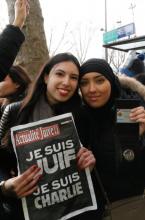
As France emerges from its worst terrorist attack in decades, a biting novel that imagines the country governed by Islamic law is part of a swirling debate about its basic values. Will the country respond to the shootings with fear and xenophobia, as suggested by the book “Soumission,” or “Submission” — or embrace its multicultural, multifaith identity?
On Jan. 11, solidarity was on display as heads of state and religious leaders joined millions on the streets of Paris in a massive march for free expression and to honor last week’s victims from the satirical magazine Charlie Hebdo.
Along with “I am Charlie,” some protesters also chanted “I am Jewish” in tribute to the four men gunned down by one of the assailants at a kosher market.
Muslims carried signs saying, “I am Charlie and Muslim.” And on Twitter, thousands of French rallied behind “#JeSuisAhmed” — referring to policeman Ahmed Merabet, a Muslim, who also died in the attack on the magazine.
On the edge of the dense crowd, high school student Amina Tadjouri clasped a Jewish newspaper, as she stood next to a Muslim cleric railing against radical Islam.
“I’m Muslim, and I’m not OK with these killings,” she said.
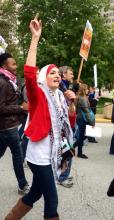
ISIS terrorist rampages, waves of anti-Muslim hate speech and fear-mongering Islamophobia are inspiring an outburst of online activism in the form of Twitter hashtags.
The question is: Does it work, especially over the long term?
An army of “clicktivists” — a mix of earnest advocates and pointed satirists — has entered the fray armed with 140-character positive, peaceful or humorous counter-messages.
Using names such as #TakeOnHate, #IStandUpBecause, and #NotInMyName, the pushback approach promotes the complexity, diversity and positive contributions of Islam and Muslims. Others, such as #MuslimApologies, offer sarcasm in service of the same message.
Yet the hashtags are often immediately co-opted by trolls spewing an opposite message. And some experts question whether clicktivist campaigns have lasting worth.
Linda Sarsour has no doubt they do. She’s a Brooklyn-based Palestinian activist in the streets and on social media and a co-creator of #TakeOnHate. The hashtag is accompanied by a resource website, launched in March by the National Network for Arab American Communities.
“The insidious thing about anti-Arab hate speech is that it seems to be acceptable, where the ‘N-word’ or anti-Semitic remarks are not taken with the same degree of outrage,” said Sarsour, who was chased down the street in September by a man who was later arrested for threatening to behead her.
A public opinion war on Middle East politics is playing out this spring in new advertising campaigns on public buses and in newspapers.
It began when the American Muslims for Palestine (AMP) launched bus ads during the April Cherry Blossom Festival condemning U.S. aid to Israel because of that country’s continuing occupation of Palestinian territories.
Then on Monday, Pamela Geller’s American Freedom Defense Initiative countered by deploying 15-foot-long ads on 20 buses in the Washington, D.C., system that equate opposition to Israel’s policies with Nazism. One ad shows the grand mufti of Jerusalem meeting Hitler during World War II.
“The bus system is considered public space, so speech has First Amendment protections,” said Caroline Laurin, a spokeswoman for the Washington Metropolitan Area Transit Authority. “We have no grounds to refuse ads due to their content.”